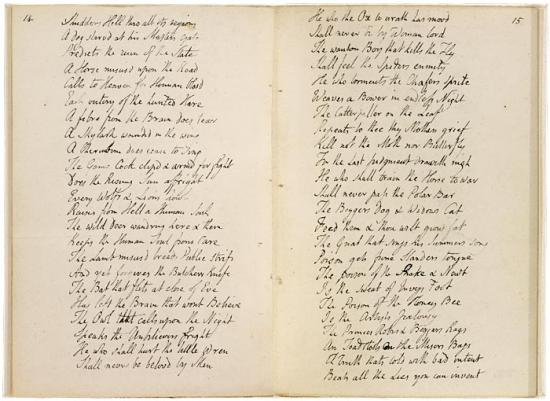
The Pickering Manuscript
[Autograph fair copy].
Gift of Mrs. Landon K. Thorne, 1971
This volume of ten poems in Blake's hand is the unique source for seven of his poetic works, including "Auguries of Innocence."
A dog starved at his master's gate
Predicts the ruin of the state.
The manuscript is named for a previous owner, B. M. Pickering, who acquired it in 1866 and published it for the first time that year. The poems probably date from about 1801 to 1804. As a "fair copy," it shows that Blake had copied all of the poems into a neat form with few corrections. Based on its paper stock and internal references, the manuscript has been dated to about 1807.
William Blake (1757–1827) occupies a unique place in the history of Western art. His creativity included both the visual and literary arts. In his lifetime he was best known as an engraver; now he is also recognized for his innovative poetry, printmaking, and painting. Blake's keen perception of the political and social climate found expression throughout his work. His strong sense of independence is evident in the complex mythology that he constructed in response to the age of revolution.
Blake was already recognized as an engraver at age twenty-five, when his first volume of poems appeared. At thirty-three, in The Marriage of Heaven and Hell, he audaciously claimed that his birth had marked the origin of a "new heaven" in which his own art would exemplify the creativity prefigured by Milton and Michelangelo. By that time, Blake, in one of his most productive periods, had already produced Songs of Innocence and was at work on a series of illuminated books. In 1818 he met John Linnell, a young painter and engraver, through whom a group of young artists became Blake's followers. Calling themselves the Ancients, they helped perpetuate Blake's influence for generations.
The Morgan's Blake collection—one of this country's most distinguished—began with purchases as early as 1899 by Pierpont Morgan. During the tenure of Charles Ryskamp, director from 1969 to 1986, major gifts almost doubled the size of its Blake holdings. In recent years Ryskamp's own gifts of engravings, letters, and related materials have significantly enriched its scholarly resources.
Shudders Hell thro all its regions
A dog starvd at his Masters Gate
Predicts the ruin of the State
A Horse misusd upon the Road
Calls to Heaven for Human blood
Each outcry of the hunted Hare
A fibre from the Brain does tear
A Skylark wounded in the wing
A Cherubim does cease to sing
The Game Cock clipd & armd for fight
Does the Rising Sun affright
Every Wolfs & Lions howl
Raises from Hell a Human Soul
The wild deer wandring here & there
Keeps the Human Soul from Care
The Lamb misusd breeds Public strife
And yet forgives the Butchers Knife
The Bat that flits at close of Eve
Has left the Brain that wont Believe
The Owl that calls upon the Night
Speaks the Unbelievers fright
He who shall hurt the little Wren
Shall never be belovd by Men
He who the Ox to wrath has movd
Shall never be by Woman lovd
The wanton Boy that kills the Fly
Shall feel the Spiders enmity
He who torments the Chafers sprite
Weaves a Bower in endless Night
The Catterpiller on the Leaf
Repeats to thee thy Mothers grief
Kill not the Moth nor Butterfly
For the Last judgment draweth nigh
He who shall train the Horse to War
Shall never pass the Polar Bar
The Beggers Dog & Widows Cat
Feed them & thou wilt grow fat
The Gnat that sings his Summers song
Poison gets from Slanders tongue
The poison of the Snake & Newt
Is the sweat of Envys Foot
The Poison of the Honey Bee
Is the Artists jealousy
The Princes Robes & Beggars Rags
Are Toadstools on the Misers Bags
A truth thats told with bad intent
Beats all the Lies you can invent
This online exhibition is presented in conjunction with the exhibition William Blake's World: "A New Heaven Is Begun" on view September 11, 2009, through January 3, 2010.
This exhibition is made possible through the generosity of Fay and Geoffrey Elliott.
